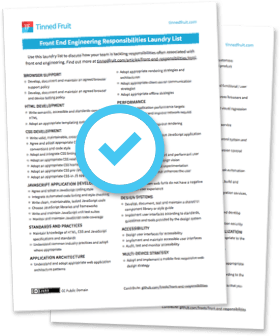Everybody wants to be (internet) famous
Like any other industry, web development has its high-profile experts.
You know, the crowd who write popular articles, books and courses, tread the high-profile conference circuit and all seem to know each other.
We often call these technical experts internet-famous. We assume that they get better employment and consulting opportunities because of their deep expertise.
And so achieving internet-fame can be seen as a clear and aspirational path to success for many developers.
But it probably isn’t for you.
These days, the web is so technically rich that our experts narrow their focus to individual technologies, tools, frameworks or solutions. Sara Soueidan? SVG. Rachel Nabors? Animation. Jina Anne? Design Systems. Not to mention all the JavaScript framework figureheads.
When we look around for expertise on a specific topic, we usually end up drawing on the work of the same two or three experts.
To become one of these canonized experts, you need determination, discipline, moxie, chutzpah and a lot of hard work over a long period of time. It’s tough.
Fortunately, deep technical expertise is not the only route to success.
It’s not even the most common way.
To put this in the context of your own career, it’s useful to think about who your audience is.
Technical experts are speaking to generalist designers and developers. You are their audience. And their success is dependent on a healthy audience relationship.
Generalists have a different audience - the organisations that employee them to deliver solutions to their business need.
Speaking to a business decision maker rather than a hands-on practitioner requires a different approach.
Your employer or client ultimately wants a business outcome. More customers, more leads, improved conversion, reduced churn, better UX, access to new markets, etc.
They don’t care about your cute animated login form, as cool as it is, unless it improves one of those numbers above.
The technical specialist is there to help you build that fancy animated login form as well as it can be.
But as a generalist, it’s up to you to orchestrate all this varied technical expertise, combine it with your own, and create a coherent solution that helps the business achieve its goals.
This is the hard work that isn’t covered easily by tutorials, courses and talks. They can only cover a vaguely generalised situation. You (and your team) have to work out what works for your situation.
For me, this is the more valuable set of skills. And in its own way, it can accumulate as highly specialised expertise in its own right.
In my next email we’ll look at how we can think about all of this in terms of positioning, a term more commonly heard from the mouths of your marketing team.
And we’ll see how you can take advantage of positioning to increase your value as a technical generalist.
In the meantime, I would love it if you hit reply and answer this quick question for me:
What is your superpower as a front-end developer?
(Mine is probably my ability to construct incredibly complex table-based layouts, even after all these years of not being able to use that particular skill)
Stay tuned!
Best wishes,
– Jim
